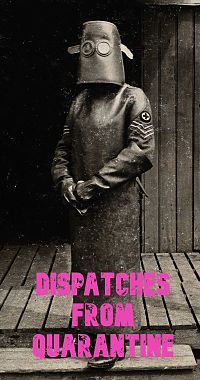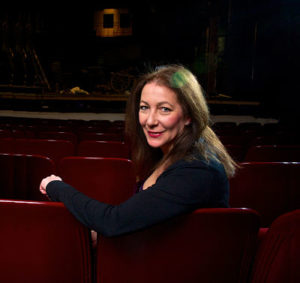“The theatre is the only institution in the world which has been dying for 4,000 years and has never succumbed. It requires tough and devoted people to keep it alive.”
― John Steinbeck, Once There Was a War
 Those of us who chose theatre as a career did it because the idea of doing anything else seemed inconceivable. It defines who we are. It is not an avocation; it is a job—a job that does not stop at 5 p.m. or on the weekends. We accepted that it would be unstable and inconsistent, and that there would be survival jobs to help pay the bills between gigs or even during a gig. We embraced the battle to have this career, but it takes its toll. The ranks are winnowed over the years in a theatrical “survival of the fittest.” Nonetheless, every theatre artist has a story about the moment they knew they had “made it.” That moment of recognition came not from peers or a major news outlet, but from a parent who boasted about our success and was silently heaving a sigh of relief that maybe, just maybe, you’ll be able to keep a roof over your head. For those who are able to do that it is a major accomplishment.
Those of us who chose theatre as a career did it because the idea of doing anything else seemed inconceivable. It defines who we are. It is not an avocation; it is a job—a job that does not stop at 5 p.m. or on the weekends. We accepted that it would be unstable and inconsistent, and that there would be survival jobs to help pay the bills between gigs or even during a gig. We embraced the battle to have this career, but it takes its toll. The ranks are winnowed over the years in a theatrical “survival of the fittest.” Nonetheless, every theatre artist has a story about the moment they knew they had “made it.” That moment of recognition came not from peers or a major news outlet, but from a parent who boasted about our success and was silently heaving a sigh of relief that maybe, just maybe, you’ll be able to keep a roof over your head. For those who are able to do that it is a major accomplishment.
There’s a phrase I’ve heard, and have probably uttered myself, which is a self-effacing, pre-COVID expression of the less-than-essential work we do: “Well, it’s not brain surgery.” We need to take that back. Theatre is vital. It is essential, and recent events have proven it. The very same performing arts that are taking the hardest and most long-lasting hit during this pandemic are the first thing everyone turned to when quarantined at home. Over 12 million viewers have enjoyed National Theatre at Home; over 2.25 million viewers watched Take Me to the World to celebrate Stephen Sondheim’s birthday. There are hundreds, perhaps thousands, of views every night of streamed productions and live readings. There are even a lucky few small groups who gather at sites worldwide to catch balcony performances, like Brian Stokes Mitchell’s in New York City or the balcony performances in Italy. These small and large events have become part of the routine: something to look forward to, the reward for making it through the day—needed distractions from the unending and terrifying news cycle.
So where does that leave us now? “Go and get a real job”? Or “Find something new”? How often have I heard this? Artists from all disciplines have heard this phrase from a parent or well-meaning friend or spouse. But let’s talk about theatre artists: In the year of the pandemic, the financial fragility of actors, dancers, singers, musicians, writers, directors, choreographers, designers, and technicians is likely to reach a crisis level never seen before. The country is facing an economic depression, and the theatrical industry is about to be hit especially hard, not because there’s a decline in the amount of work available, but because there is no work. We can get creative and do play readings on Zoom, or concerts from our living rooms, but that does not translate into salaried positions or healthcare, let alone pensions. By nature, artists are creative, adaptive, and excited to overcome obstacles; we do it all the time. But how do we survive when the root of our artistic life—theatres—are closed for many, many months?

With theatres scrambling to get through the coming months, and with unions keeping pension and health plans operational with barely a wing and a prayer, what is the reality for theatre professionals? What happens when the CARES Act expires? When unemployment runs dry? When our benefits lapse? Will the need to get a “real job” become the only conversation? And I’m not talking about waiting tables, bartending, childcare, or retail; I’m talking about dental school, packing it in, returning to your hometown to join a family business, teaching. This is the glaring threat in our industry: that we will lose practitioners from all generations. We will not just lose the energy and immediacy of newcomers. We will lose the knowledge of veterans and mid-career stalwarts because they cannot ride out this period of unemployment.
This problem exists because outside of the industry we are not wholly perceived as essential in the way that doctors, lawyers, or computer programmers are, even though the training and maintenance of skills for a true theatre professional are as extensive and ongoing. And even though the arts contribute hugely to other sectors of the economy, including the restaurant industry.
Knowing that live theatre as we know it will not be back until a vaccine is widely distributed, what are we going to do? The easy answer is to get more government relief for artists—and, yes, that should happen, but to solve the problem, it must go beyond that. I’m dismayed that so much energy is going into the intricacies of social distancing and creative seating within a pre-COVID construct, when we all know that a good percentage of our audiences will not come back until there’s a vaccine.
So is there another alternative? Can our creative energies go toward meeting that challenge? Please let it be something more than another Zoom reading/livestream rehash. Please let it include writers and designers, directors and stage managers, as well as performers. Can we put these folks back to work?
I say, yes, we can. Here at Pioneer Theatre Company, a LORT B theatre in Salt Lake City, we have begun rehiring members of our costume shop to sew masks, which we are selling through our website— rehiring them full-time with benefits. We are also working on other cottage-industry projects to be executed by our scene shop which would begin bringing them back to work. My hope is that this enables us to use fundraising dollars to hire playwrights, directors, and actors to do developmental readings and workshops of new works. Is it enough? No. Is it a start? Yes.
We have the most innovative, creative, persevering, and stubborn people working in this industry. I know there are answers, and we need to start looking for them now. I challenge every resident theatre to find a way to rehire their furloughed technical staff, as well as some actors and directors. Commit to hiring back a percentage of your regular full-time and freelance employees and get them back to work earning salaries and benefits. I challenge managing directors to stretch those PPP dollars, creating avenues of income to subsidize those jobs. I challenge artistic directors and production managers to think outside of the box for that crazy idea that will get people performing again and bring in income.
I challenge marketing and PR directors to dig deep for community support that didn’t exist six months ago. I challenge patrons to try something they’ve never experienced, delivered in a way they never knew was possible. Theatre people have never been known to wait for something to happen. We make things happen. Let’s not fail each other now.
“If you are looking for something, don’t go sit on the seashore and expect it to come and find you,” Konstantin Stanislavski once wrote. “You must search, search, search with all the stubbornness in you!”
Karen Azenberg is the artistic director of Pioneer Theatre Company in Salt Lake City, Utah.

